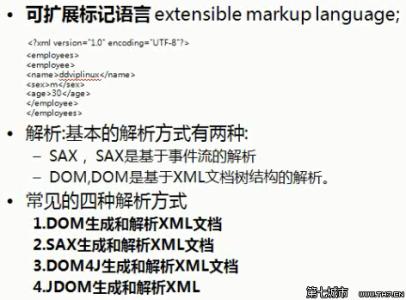可扩展标记语言(英文:eXtensible Markup Language,缩写:XML),是一种标记语言。标记指计算机所能理解的信息符号,通过此种标记,计算机之间可以处理包含各种信息的文章等。接下来小编为大家整理了Xml的由来。希望对你有帮助哦!
XML is a simplified version of SGML and a cousin of HTML. It was developed by members of the W3C and released as a recommendation by the W3C in February 1998.
SGML, the parent of XML, is an international standard that has been in use as a markup language primarily for technical documentation and government applications since the early 1980s. It was developed to standardize the production process for large document sets. Think: Medical records. Company databases. Aircraft parts catalogs. Other really huge documents.
Marking-up documents in SGML allows information to be passed from one system to the next without losing information. With databases marked-up in SGML you can see what Widget A is all about and go check to see if Widget A is in stock.
Early on, people thought that SGML would be useful for the Web. In fact, HTML is really an very basic application of SGML! But HTML quickly became used for visual layout, so a group of people returned to the basics, determined to create something that had the strengths of SGML without being so difficult to implement —— and had the ease of use of HTML, but with more structural power. The result was XML.
The design goals of XML, taken from the XML Specification are:
XML shall be straightforwardly usable over the Internet.
XML shall support a wide variety of applications.
XML shall be compatible with SGML.
It shall be easy to write programs which process XML documents.

The number of optional features in XML is to be kept to the absolute minimum, ideally zero.
XML documents should be human-legible and reasonably clear.
The XML design should be prepared quickly.
The design of XML shall be formal and concise.
XML documents shall be easy to create.
Terseness in XML markup is of minimal importance.
In other words, XML is easy to create, easy to read, and designed for use over the Internet. What more could a Web designer ask for?
 爱华网
爱华网



